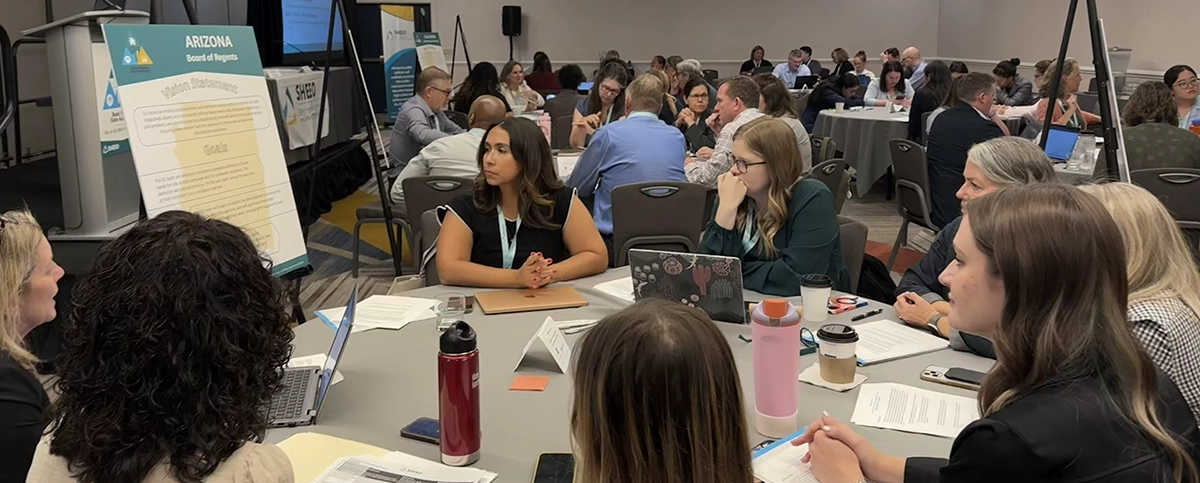
Arizona’s public universities at the forefront of multistate charge to reimagine student support through basic needs data
The Arizona Board of Regents' innovative approach to addressing college student basic needs and mental health set the tone for the State Higher Education Executive Officers Association (SHEEO) Basic Needs Data Academy national convening in downtown Phoenix.
The convening brought together seven states, including Arizona, that are participating in the academy, which is focused on supporting states in expanding data capacity and developing policy infrastructure for basic needs information. Nationally, there is inconsistent collection, utilization and alignment of basic needs data. Basic needs insecurities, such as insufficient access to food or housing, may impede academic success of impacted students.
During a fireside session at the convening, Student Regent Jadyn Fisher and ABOR Executive Director Chad Sampson highlighted how the board is leveraging data-driven strategies to enhance student success while ensuring student voices remain central to decision making. University-specific surveys and an annual basic needs report provide insight into how campuses are expanding support services and addressing challenges. The board also leads student-centered listening sessions to strengthen mental health awareness and resources.
These efforts underscore the board’s ongoing commitment to using data and student feedback to drive meaningful improvements in the student experience across Arizona’s public universities.
“My hope is that improved data strategies that prioritize student well-being will help us identify students, early on, who are struggling,” said Regent Fisher. “This will inform outreach strategies to support students before they reach a point where they might need to drop out or switch paths. The success of every student is a board priority and through this academy, I’m hopeful we will define new ways to leverage data to benefit our students.”
Arizona’s basic needs initiative was launched by student regents in 2020. In 2024, the board expanded its focus on students’ basic needs to encompass student well-being, including mental health. This year, the board implemented mental health listening sessions across institutions to provide in-person support and gather qualitative data about student experiences and overall well-being.
“What gets measured gets managed,” Sampson said. “Our ultimate purpose is serving students. Every data point represents a student's potential, and our job is to understand and remove the barriers preventing their success. By collecting and understanding this data, we can tie our priorities directly to our core mission of supporting Arizona's workforce and creating meaningful educational opportunities.”
Through participation in SHEEO’s Basic Needs Data Academy, states will:
- Better understand their basic needs data landscape, including required capacities and necessary partnerships with institutions, state agencies and stakeholders.
- Develop a definition of basic needs and a taxonomy of basic needs data that align across state agencies, institutions and partner organizations.
- Create surveys or collect data elements that capture students’ basic needs insecurity indicators and corresponding services, programs and interventions.
- Integrate new or refined basic needs data into postsecondary student unit record systems to improve tracking and effectiveness of associated policies, programs or interventions to improve student experiences, and academic and nonacademic outcomes.
- Improve awareness of basic needs data and associated policies and programs.
“Our Basic Needs Data Academy is helping states build stronger data systems to improve student supports. We’re excited to have the Arizona Board of Regents among the seven state teams leading this effort,” said SHEEO Senior Vice President and Chief of Staff Christina Whitfield. “During our opening session, Executive Director Sampson and Student Regent Fisher helped to frame our conversations with a timely reminder to center the student voice and other ways Arizona is advancing this work.”
Also during the convening, Roxanne Murphy, ABOR director of postsecondary attainment, led a session on creating actionable data insights, featuring a groundbreaking data dashboard developed by ASU and St. Mary's Food Bank. The dashboard visualizes food insecurity and distribution patterns across the state, integrating data from federal, state and nonprofit sources. It enables organizations to identify high-need areas and understand demographic nuances of food insecurity, especially around university campuses.
“The thing that impressed me most about the ASU team is their commitment to not only the data and the project, but also to our mission,” said Marcos Gaucin, St. Mary’s Food Bank chief programs officer. “It's important for us to be able to identify demographics and things like home ownership and vehicle ownership, so that we can cater our services to best meet the needs of the community.”
The dashboard, developed with ASU student involvement, reflects a collaborative approach to addressing community challenges. Project leaders Dr. Aaron Flores, assistant professor, and Dr. Connor Sheehan, associate professor at ASU, credited graduate student Alexi Vogel for leading the development of the interactive platform. The tool allows users to explore spatial relationships between food distribution sites, grocery store access and food insecurity rates.
“This dashboard isn’t just about data, it’s about impact,” said Dr. Flores. “By integrating data from a variety of sources, we’re helping organizations visualize food insecurity in near real time and understand the demographic factors that shape it. That’s enabling them to tailor services more precisely and ensure resources reach the right people at the right time.”
 Back to Listing
Back to Listing